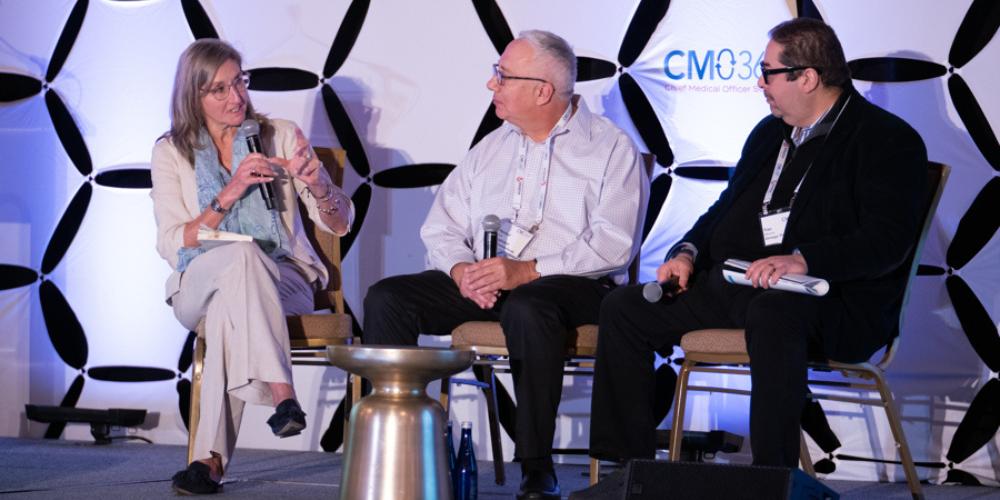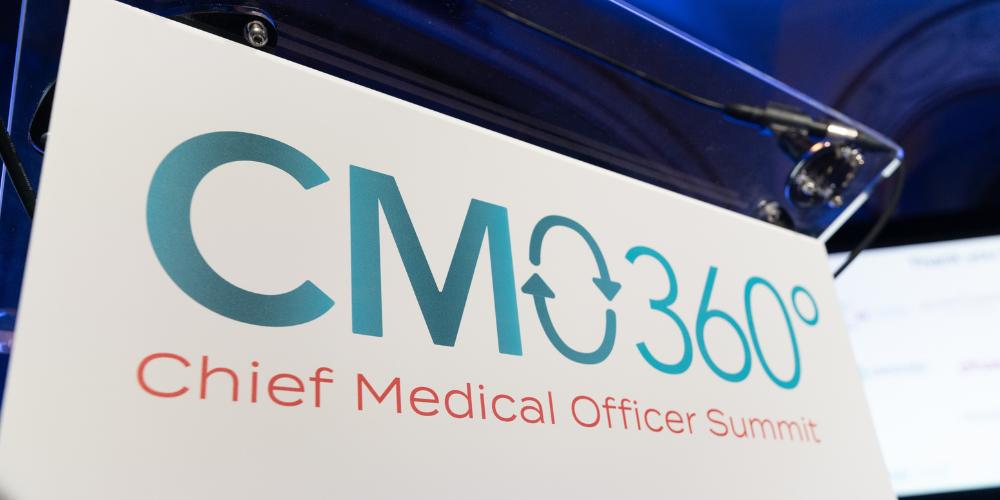
Tell us about your career journey.
I'm an internal medicine physician by training. I trained at the University of Texas Medical School of Houston where I did my internship, residency and fellowship. I joined the faculty there for about six and a half years, where I taught residents and students. I saw patients and did some clinical research. My field of interest was HIV disease. It was a difficult time because we were just starting to get some of the newer medications for treating HIV and they were very toxic. And I kept telling myself, someone needs to come up with better medications that are more tolerable for patients. I kept saying that and saying that, and then I realized that the person who needed to come up with a better drug was me. So I was recruited out of academia to go into a small company developing a monoclonal antibody for treatment of HIV.
The company was acquired by a much larger pharmaceutical company that didn't want to go into the HIV therapeutic area, so they asked me to help them out-license our very promising antibody to another company. I did, and that company hired me to be their CMO and we ultimately got that drug approved: Trogarzo, the first monoclonal antibody for treatment of drug resistant HIV.
About that time, I got a call from my former CEO and she asked me to come out to California and help her with a new company that was developing a drug for treatment of hospitalized influenza and parainfluenza. This drug was very similar in its mechanism of action as to the one that I'd worked on before and I started working on that product. We raised a hundred million dollars, which is not easy for an infectious disease company. And we had gotten a breakthrough therapy designation and were starting our phase three clinical trial when COVID hit. And COVID basically “cured” the flu so we could not enroll that trial to save our lives.
It was a very difficult time, and I was asked to go out and help us find some additional drugs for our pipeline. I did and was very fortunate to stumble upon a medication that I thought was really interesting because it was a lytic peptide, which is kind of like an antibiotic, but they had retooled it to treat cancer. I thought the idea of killing malignant cells the same way we kill bacteria was an amazing idea but our leadership team was not on the same page so we passed on the molecule. We agreed that the best thing was for me to start a new company and take that asset in and raise money in the new shell to get the drug into the clinic and determine its utility for treating cancer.
I did that in December 2021. Unfortunately, it was the worst time – perhaps ever – to try to raise money for a startup biotech company. So we started our seed round and then our series A which is where we are now, looking to get our drug back to the clinic and show its utility.
"Our industry has shifted and drifted toward a worship of the complex. Simplicity is better and sometimes this sexy science is not as useful, helpful or safe as less complex interventions."
What has your experience been moving between modalities and indications?
As an internal medicine physician, I feel comfortable working in and around different indications. I have a sort of north star when it comes to developing drugs. I took my Hippocratic Oath very seriously so the first thing I have to understand about any drug is that it must be safe and well tolerated. I think nature will give us clues. If we look at the normal way the body responds and use that as a baseline for any intervention we’re going to introduce, that will always be better than if we go in with the idea of attaching or targeting or inhibiting. That mindset is often where those side effects and off target effects happen. As soon as you start playing with one thing and pulling on one thread, you cause unraveling in places you didn’t anticipate. Finding the way the physiology works is key to creating interventions that are safe and tolerable.
Finally, I follow the KISS principle: Keep It Simple, Stupid. Our industry has shifted and drifted toward a worship of the complex. Simplicity is better and sometimes this sexy science is not as useful, helpful or safe as less complex interventions. So when developing a drug I try to ask: Is it safe? What does nature say about this process? And can we take the simplest route to restoring health?
What made you decide to transition to a CEO role?
You have to go back to the transition from seeing patients every day to deciding to go into drug development. The idea that I needed to do something more was innate. It was about serving patients better. Where do I best fit? I felt too downstream being in the room taking care of patients one at a time. I also went to the school of public health where I became enamored with the idea that the population is your patient rather than the one patient in your room. Balancing that, I felt that the population approach was more resonant with me.
I learned a lot in drug development. In the hospital, MD stands for “makes decisions.” When you go into industry, you’re on a team and your opinion is one of a number of opinions. So I had to adjust to the idea that my opinion and the PK guy’s opinion were really equal and we’re all putting our opinions together to try to come up with the best solution for the company. The decisions that would ultimately direct the company were mostly being made by the CEO and there were some times where my opinion was not the opinion that prevailed in a leadership or management meeting.
Over time, I realized that if I wanted to have the influence over which direction we would go – whether for pricing or clinical trials or assets – I would have to be higher up in the decision making process. I realized that if I was going to create the company and products I wanted to create for patients, I would need to make that leap.
"When you become CEO, the company is your patient. You not only have the matters relating to the patient in the doctor’s room or the drug but also matters relating to employees, managing a company and navigating financing."
As CEO, do you feel that you’re making the decisions you would have made as CMO?
I have a newfound respect for CEOs now that I am one. It has been a maturation process. When you are the doctor taking care of a patient, you know who the patient is because they are sitting in front of you. When you go into drug development, particularly when you’re a CMO, it’s like the drug is your patient and you’re trying to support that drug through the process of development such that it becomes available to patients who need it. When you become CEO, the company is your patient. You not only have the matters relating to the patient in the doctor’s room or the drug but also matters relating to employees, managing a company and navigating financing. You don’t forget about the previous things; you add more to your plate.
When you’re a CMO, you can fight and advocate for your drug and patients as much as you want. Until you’re sitting in the CEO’s seat, you don’t have the perspective of needing to keep the company afloat as well. It’s an enlightening experience.
Are there any other skills that a CEO needs that are different from a CMO?
I think the skill CMOs becoming CEOs are least prepared for is that fundraising/financing piece. How do you engage the investment community that you have a great product, great company, the right team of people, and the right plan to be successful quickly and efficiently. Can you convince the people who write checks of that? CMOs are good at translating science and medical and clinical aspects of the drug development story. But putting it all together is another skill.
By the time you’re in the C-suite, you’re comfortable managing people and inspiring teams to work together. You grow into working cross-functionally. As CMO, you interact with the CMC team and finance team and legal team etc. But you don’t have to integrate. You know the folks you mainly focus on like biostatistics and regulatory and pharmacology and you might work with preclinical or commercial based on the stage of the company but these are more like service areas. Legal is incredibly important for IP and potential SEC or antitrust issues and a CEO, unlike a CMO, needs to be very comfortable interacting with people from this area. A CEO needs to roll up their sleeves and understand how that integrates into the whole process and balance the interest of moving the company forward.
How can CMOs learn these skills or bridge the gaps when they become CEOs?
You have to stay intellectually curious outside of your clinical expertise and what brings you to the table as an expert. You have to learn from the other team members around you.
For me, it was really just the experience. Living through it from phase one all the way to commercial has given me an opportunity to work both in-house with lots of different disciplines and to engage with vendors and other contract organizations. There are lots of lessons to learn and you have to have an open-minded, curious mindset and realize that everyone around the table is a potential teacher.
"If you’re a CMO thinking about the jump to CEO, look for a place where you are valuable and where your skill set affords you core knowledge and where you can develop drugs to diseases that you are most passionate about."
How should CMOs determine if the CEO role is right for them?
For me, the decision about making that transition was about whether I felt passionately about the molecules I was going to develop. If you have a broad business degree or background and leadership qualities you may have learned or gained from experience, you could probably be a CEO of any number of companies in different industries. If you’re a CMO thinking about the jump to CEO, look for a place where you are valuable and where your skill set affords you core knowledge and where you can develop drugs to diseases that you are most passionate about. If you can connect to a company that is developing a molecule or fighting a certain disease or therapeutic area that is resonant to you, that's the company that you should focus on for being a CEO.
I would tend to avoid going just because there's a great paycheck or just because of a location or just because you know it's in medicine. If it doesn’t move you, you might as well be the CEO of a clothing store.
What could CMOs be doing better to support their CEOs?
Be a strong advocate for doing what’s best for patients and also know when to back off. You need to know when to be a good team player and not just flex your medical degree or experience. Money does matter. Keeping investors happy means that you can’t only look at patients but you also need to be the patients’ advocate in the boardroom. Finding the balance is difficult but key.
Can you talk about the Just Society?
I'm one of the founding 50 members of the Just Society. We are a community of Black male executives in the biotech industry who have come together to network. Often, we find ourselves as the only person who looks like us in the board room and it can feel isolating. The Just Society was created so that we could share our experiences and talk about challenges and opportunities for advancement within our industry.
If you want to move beyond incremental improvements and get beyond the plateaus to achieve real breakthroughs, you need to broaden your horizon and introduce more people to the table.
How can we make biotech more diverse and equitable as an industry?
DEI has been under fire in the US over the last few political cycles and I think that a lot of that comes from the idea that racial minorities and women are somehow not qualified for positions but are being selected in an effort to diversify. But just like death is an outcome and not an AE, diversity is an outcome of having an equitable situation.
The problem isn’t talent; you’re not hiring people who are not qualified. The problem is opportunity. You don’t know who those qualified people are. The effort by industry has to be twofold: One is to be broad when you look to hire, promote or retain certain permissions. Two is to acknowledge that the way we have done things in the past has not been equitable. We did not create the opportunity for everyone and we need to get rid of some of those legacy systems, like the idea that you only hire from a familiar group of people around you. There’s an awakening that has to happen on the part of those already in positions of power and influence within industry.
I also think there is a responsibility on the side of racial minorities and women. Women have been doing a great job of recognizing that if they want to be the CEO of a company it is a lot easier if they are also the founder of it. It’s a lot easier to get a promotion to the C-suite or a board seat if the company is founded and run by women. We need to find our ways into entrepreneurial roles where we can have the opportunity to express and flex our leadership muscles.
If you want to move beyond incremental improvements and get beyond the plateaus to achieve real breakthroughs, you need to broaden your horizon and introduce more people to the table. And those people will, by definition, be different because you are looking for different thoughts and different perspectives in order to achieve different outcomes. This is not an insurmountable challenge, but it will require that we change the way we do things.
Anything else?
I’m still a CMO at heart. I haven’t forgotten how important the position is in the drug development continuum and how important that role is when it comes to advocating for patients. CMOs bridge the corporate to clinical gap and without this vital function, pharma and biotech would be far less useful and far less effective. CMOs rule!









